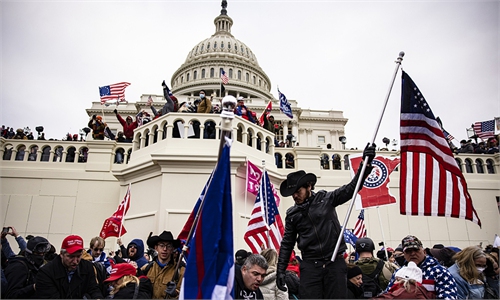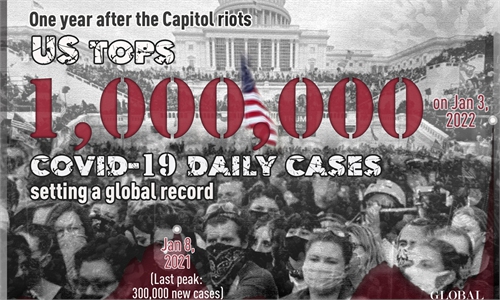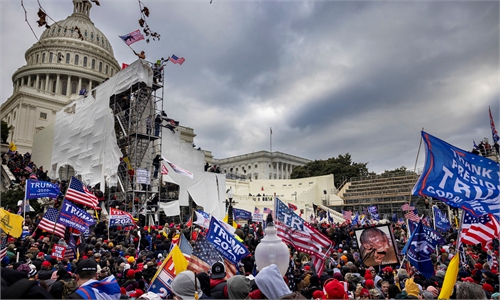One year later, nightmare of Capitol Insurrection still haunts hearts and minds of a divided people: Martin Jacques

Photo: AFP
January 6 will be the first anniversary of the Insurrection. Several thousand Americans from all over the country marched on Capitol Hill, the seat of American democracy, intent on occupying the building and preventing the confirmation of Joe Biden as the country's president. It had been long in the planning. Donald Trump spoke to the insurgents before they began their march, assuring them that he would be there to meet them at Capitol Hill. Steve Bannon, formerly one of Trump's closest aides, was intimately involved in the planning. It was an attempted coup d'etat in the heartland of Western democracy. It shocked a nation that had already begun to fear the worst about the future of its democracy as, prior to the election, Trump refused to say that, if defeated, he would honor the result. He was true to his silence. When the result was announced Trump refused to accept it. To this day he continues to claim that he, not Biden, won, and the election had been stolen.America has tried to forget its nightmare and pretend that all was well with its democracy, as exemplified by Biden's Summit for Democracy last month. But the memory of the insurrection continues to haunt the country, with Trump and the great majority of Republicans continuing to assert that he won the election. How can a democracy work if one of the two parties refuses to accept the legitimacy of the previous election? Western-style democracies depend for their functioning on a consensus; if there isn't one, the result is polarization and paralysis. The memories of the nightmare are now being reawakened by the prospect of congressional elections in November, when it is likely the Republicans will win the House of Representatives, and possibly also the Senate, thereby potentially rendering Biden a dead duck president in the last two years of his term. And just over the horizon, in 2024, looms the next presidential election and the possible return of Trump.
There is no question that American democracy is in deep trouble. There is not one cause but many. Given that around half the labor force has experienced either stagnant or declining real wages for four decades, it is hardly surprising that many are dissatisfied with their lot and increasingly disillusioned with politicians and the political system. To compound matters, this has been accompanied by a process of growing inequality. To add to the mix, America's relative decline in the world, a totally new phenomenon for a country that has remarkably been on the rise since its inception in 1776, is a further source of discontent and disillusionment in their leaders and the country's governing institutions.
The combined result is a mood of alienation, antipathy, and anger. Old racial divides between white and black Americans dating back to slavery have become more pronounced, with Trump deliberately seeking, by means of constant innuendo, to stoke long-standing white resentment against blacks and fan the flames of white supremacy. A recent book by Heather Cox Richardson argues that while the North won the civil war, in the long run, the contrary is proving to be the case, that in fact, the South has proved the real victor.
America is now divided like never before. An electoral map tells the story, with the Democrats largely dominant on the eastern and western seaboards and the Republicans dominant in the huge but less densely populated interior. The political gulf between the two parties has grown ever wider. There is no longer one truth but two. Many Republicans don't believe in vaccination or mask-wearing in contrast to Democrats who support vaccination. The best example of this fracturing of the truth, however, lies in those two opposing narratives about who won the election.
Where will this process of growing polarization lead? With the country lacking a sense of direction and, apart from the demonization of China, a unifying theme, it is destined to get worse. We cannot rule out the possibility that Trump, or someone like him, will win the presidential election in 2024; indeed, it is entirely possible. This will only serve to accentuate the present divisions, as with Trump's first presidency. On the edges of US politics has been the growing violence, epitomized by the Proud Boys, that just a year ago reached the very core of American politics with the insurrection. Can American democracy survive these kinds of divisions? It is far from certain, which is an extraordinary thing to say given how central it has been to the American story. But who, just a handful of years ago, could have imagined that an attempted coup d'etat, with the implicit blessing of the outgoing president, could have taken place on January 6, 2021?
One thing is clear. American democracy will almost certainly never again enjoy the global influence and attraction that it has for so long exercised. Those days have gone. And if the situation continues to deteriorate, America's appeal will nose-dive. Even its old ally Europe, which already has serious misgivings, will distance itself in a most profound way from the US.
The author was until recently a Senior Fellow at the Department of Politics and International Studies at Cambridge University. He is a Visiting Professor at the Institute of Modern International Relations at Tsinghua University and a Senior Fellow at the China Institute, Fudan University. Follow him on twitter @martjacques. opinion@globaltimes.com.cn




